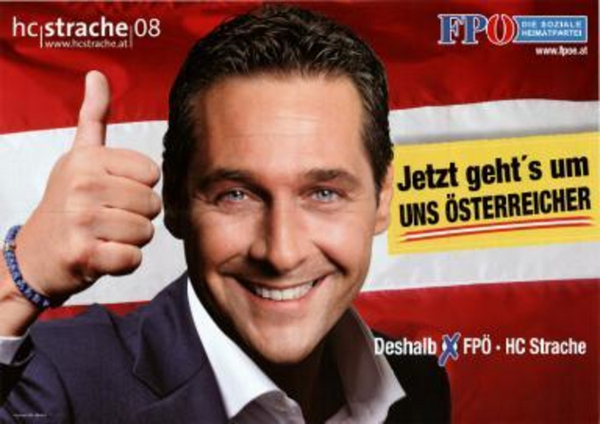(copy 1)

National Council election 2008
At the early National Council election of 28 September 2008, Heinz-Christian Strache again stood as the FPÖ’s lead candidate. The Freedom Party achieved 17.54 per cent of the vote, which constituted a clear increase of 6.5 percentage points, and obtained 34 National Council seats (plus 13).
Despite significant losses, the SPÖ emerged from the election as the strongest party and its leader, Werner Faymann, once more became Chancellor. The ÖVP again lost heavily, the Greens experienced modest losses and became the fifth-strongest party in the National Council, behind the BZÖ, which managed to obtain 10.70 per cent of the vote.
Brief description of the election campaign
Following the resurrection of the Grand Coalition in 2007, the government led by Alfred Gusenbauer was rarely able to achieve agreement over major issues. SPÖ-internal disputes led to Werner Faymann taking over the party in June 2008. Shortly after, in July 2008, ÖVP Chairman Wilhelm Molterer declared the coalition at an end, using the words “That’s enough”.
Given its success in 2006, the Freedom Party again opted for Heinz-Christian Strache as its lead candidate and the themes that had already been prioritised in the 2006 election campaign also remained more or less the same.
Key slogans were “Volksvertreter statt EU-Verräter” (“People’s representatives, not EU traitors”), “Asylbetrug heißt Heimatflug” (“Asylum fraud and you’re homeward bound”), “Einkommen zum Auskommen” (“Wages to get by on”), “Heimatland braucht Mittelstand” (“Homeland needs SMEs”), “Soziale Sicherheit für unsere Leut’ (“Social security for our folk”), as well as “Sie sind gegen ihn, weil er für Euch ist“ (“They are against him because he is for you”), which was just like Jörg Haider’s 1990s poster, albeit now with Heinz-Christian Strache’s likeness.
Election result
The following parties and electoral lists, among others, stood for election at the National Council election of 2008:
Sozialdemokratische Partei Österreichs (SPÖ)
Österreichische Volkspartei (ÖVP)
Freiheitliche Partei Österreichs (FPÖ)
Die Grünen – Die Grüne Alternative (GRÜNE)
Bündnis Zukunft Österreich (BZÖ)
Liste Dr. Martin – (MATIN)
Kommunistische Partei Österreichs (KPÖ)
EU-Austritt – Neutrales Freies Österreich (NFÖ)
Sozialistische LinksPartei, Liste gegen Kapitalismus und Rassismus (SLP)
Sicher - Absolut - Unabhängig, Franz Radinger (SAU)
Initiative 2000 (IVE)
Liste Stark (STARK)
Parties | Votes | Vote share 2008 | ± | Seats 2008 | ± |
SPÖ | 1,430,206 | 29.26% | -6.08% | 57 | -11 |
ÖVP | 1,269,656 | 25.98% | -8.35% | 51 | -15 |
FPÖ | 857,029 | 17.54% | +6.50% | 34 | +13 |
BZÖ | 522,933 | 10.70% | +6.59% | 21 | +14 |
GRÜNE | 509,936 | 10.43% | -0.61% | 20 | -1 |
Government formationWhile both coalition parties, the SPÖ and ÖVP, suffered significant losses, the FPÖ and BZÖ made major gains and together, they achieved about 27 per cent of the vote. Nonetheless, it was agreed again to continue with a red-black coali
While both coalition parties, the SPÖ and ÖVP, suffered significant losses, the FPÖ and BZÖ made major gains and together, they achieved about 27 per cent of the vote. Nonetheless, it was agreed again to continue with a red-black coalition under the leadership of SPÖ Chancellor Werner Faymann.
